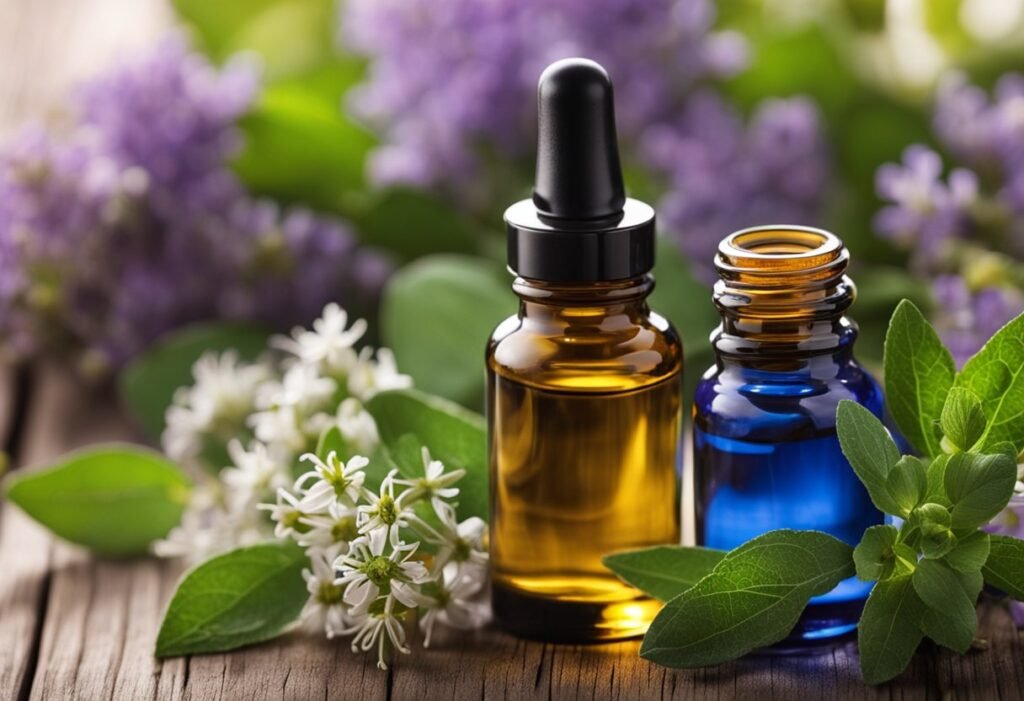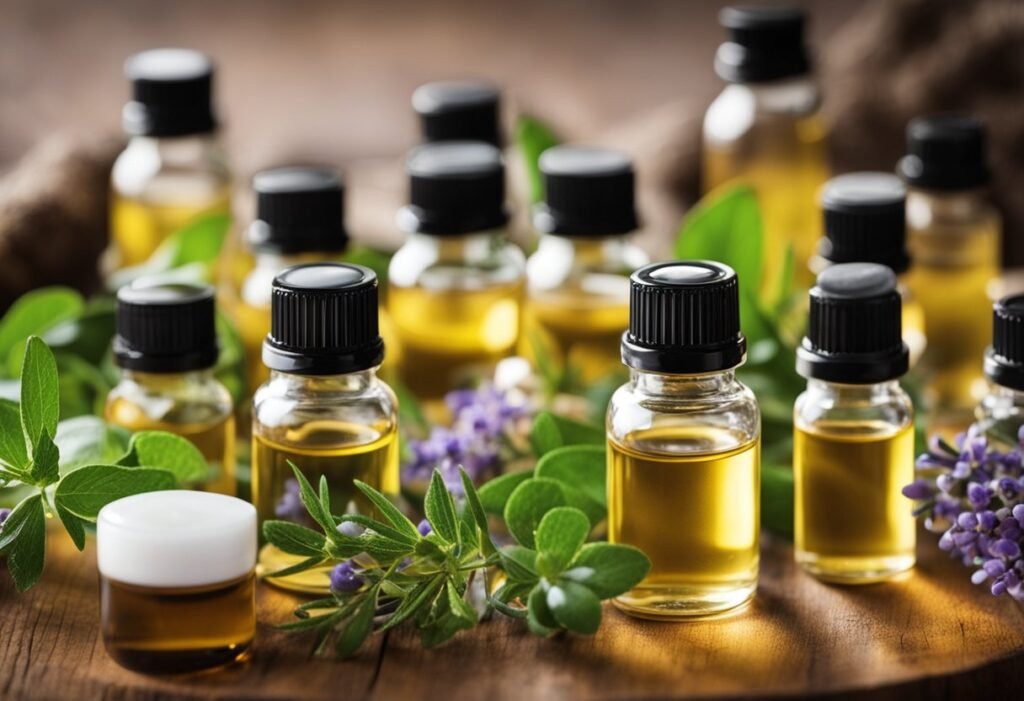Essential oils have become increasingly popular in recent years due to their various health benefits. One of the many conditions that essential oils have been found to help with is seborrheic dermatitis. Seborrheic dermatitis is a common skin condition that causes red, scaly patches on the scalp and other areas of the body.
While there is no cure for seborrheic dermatitis, essential oils have been found to be effective in managing symptoms. Essential oils such as tea tree oil, lavender oil, and peppermint oil have anti-inflammatory and antifungal properties that can help reduce inflammation and control the growth of fungi that contribute to the condition. In this article, we will explore the use of essential oils for seborrheic dermatitis and provide tips on how to use them safely and effectively.
Understanding Seborrheic Dermatitis

Seborrheic dermatitis is a common skin condition that affects millions of people worldwide. It is a chronic inflammatory disorder that affects the skin on the scalp, face, and other parts of the body. The exact cause of seborrheic dermatitis is unknown, but it is believed to be caused by a combination of genetic, environmental, and immune system factors.
Seborrheic dermatitis is characterized by red, scaly, and itchy patches of skin. It can be mild or severe and can occur in people of all ages. The condition is more common in men than women and tends to occur more frequently in people with oily skin.
The symptoms of seborrheic dermatitis can be managed with a variety of treatments, including the use of essential oils. Essential oils are natural plant extracts that have been used for centuries to treat a variety of skin conditions. They are highly concentrated and can be used topically or inhaled to provide relief from the symptoms of seborrheic dermatitis.
In the next section, we will discuss some of the most effective essential oils for treating seborrheic dermatitis.
The Role of Essential Oils

Essential oils have been used for centuries for their therapeutic properties. They are highly concentrated plant extracts that have been shown to have anti-inflammatory, antifungal, and antimicrobial properties. These properties make them a potential treatment option for seborrheic dermatitis.
Tea tree oil, lavender oil, and peppermint oil are some of the essential oils that have been studied for their effectiveness in treating seborrheic dermatitis. Tea tree oil has been shown to have antifungal properties that can help reduce the growth of Malassezia, the yeast that is associated with seborrheic dermatitis. Lavender oil has been shown to have anti-inflammatory properties that can help reduce redness and inflammation associated with seborrheic dermatitis. Peppermint oil has been shown to have antimicrobial properties that can help reduce the growth of bacteria associated with seborrheic dermatitis.
It is important to note that essential oils should always be used with caution. They are highly concentrated and can cause skin irritation if not diluted properly. It is recommended to dilute essential oils with a carrier oil, such as coconut oil or jojoba oil, before applying to the skin. It is also important to do a patch test before using essential oils to ensure that you are not allergic to them.
Overall, essential oils have the potential to be an effective treatment option for seborrheic dermatitis. However, more research is needed to determine their effectiveness and safety. It is important to consult with a healthcare professional before using essential oils as a treatment option for seborrheic dermatitis.
Choosing the Right Essential Oils

When it comes to managing seborrheic dermatitis, essential oils can be a helpful addition to your skincare routine. However, not all essential oils are created equal, and some may be more effective than others. Here are a few essential oils that have been shown to be beneficial for seborrheic dermatitis:
Tea Tree Oil
Tea tree oil is a popular essential oil that has been used for centuries for its antimicrobial and anti-inflammatory properties. It has been shown to be effective in reducing the symptoms of seborrheic dermatitis, such as redness, itching, and flaking. However, it is important to note that tea tree oil can be irritating to some people, so it should always be diluted before use.
Lavender Oil
Lavender oil is another essential oil that has been shown to have anti-inflammatory properties. It can help reduce the redness and irritation associated with seborrheic dermatitis, and its relaxing scent can help ease stress and anxiety. However, lavender oil should also be diluted before use, as it can be irritating to some people.
Peppermint Oil
Peppermint oil is known for its cooling and soothing properties, which can help relieve the itching and discomfort associated with seborrheic dermatitis. It also has antimicrobial properties that can help prevent infections. However, peppermint oil should be used with caution, as it can be irritating to some people and should always be diluted before use.
Eucalyptus Oil
Eucalyptus oil is another essential oil that has antimicrobial and anti-inflammatory properties. It can help reduce the symptoms of seborrheic dermatitis, such as itching and flaking, and can also help prevent infections. However, like the other essential oils mentioned, eucalyptus oil should be diluted before use, as it can be irritating to some people.
In conclusion, essential oils can be a helpful addition to your skincare routine when managing seborrheic dermatitis. However, it is important to choose the right essential oils and use them properly to avoid any potential irritation or adverse reactions. Always dilute essential oils before use and test them on a small patch of skin before applying them to larger areas.
How to Use Essential Oils for Seborrheic Dermatitis

Seborrheic dermatitis is a common skin condition that can be frustrating to manage. Essential oils have been found to be effective in treating seborrheic dermatitis symptoms such as redness, itching, and flaking. Here’s how to use essential oils for seborrheic dermatitis.
Topical Application
Topical application of essential oils can be done in a few ways. One way is to add a few drops of essential oil to a carrier oil such as coconut oil, and then apply it to the affected area. Another way is to add a few drops of essential oil to a gentle, unscented lotion and then apply it to the affected area.
Here are some essential oils that have been found to be effective in treating seborrheic dermatitis:
- Tea tree oil: known for its anti-inflammatory and antifungal properties, tea tree oil can help reduce inflammation and fight the yeast that can contribute to seborrheic dermatitis.
- Lavender oil: has anti-inflammatory and soothing properties that can help reduce redness and itching.
- Rosemary oil: has antimicrobial properties that can help fight the bacteria and yeast that can contribute to seborrheic dermatitis.
It’s important to note that essential oils should always be diluted before use, as they can be irritating to the skin when used undiluted.
Aromatherapy
Aromatherapy is another way to use essential oils for seborrheic dermatitis. Simply add a few drops of essential oil to a diffuser or humidifier and breathe in the steam.
Here are some essential oils that can be used for aromatherapy to help manage seborrheic dermatitis symptoms:
- Eucalyptus oil: has anti-inflammatory and antimicrobial properties that can help reduce inflammation and fight bacteria and yeast.
- Peppermint oil: has cooling and soothing properties that can help reduce itching and redness.
- Lemon oil: has antifungal and antimicrobial properties that can help fight the yeast that can contribute to seborrheic dermatitis.
Aromatherapy can be a relaxing and effective way to manage seborrheic dermatitis symptoms, but it’s important to note that essential oils should never be ingested.
Precautions When Using Essential Oils
When using essential oils to treat seborrheic dermatitis, it is important to take certain precautions to ensure that you are using them safely and effectively. Here are some things to keep in mind:
- Dilute the essential oils before use: Essential oils are highly concentrated and can be irritating to the skin if applied undiluted. Dilute the essential oil with a carrier oil such as coconut, jojoba, or almond oil before applying it to your skin.
- Patch test before use: Before using any essential oil for the first time, it is important to perform a patch test. Apply a small amount of diluted essential oil to a small area of skin and wait 24 hours to see if you have any adverse reactions such as redness, itching, or swelling.
- Avoid using essential oils near the eyes: Essential oils can be irritating to the eyes and should not be applied near them. If you accidentally get essential oil in your eyes, flush them with water immediately.
- Do not ingest essential oils: Essential oils are not meant to be ingested and can be toxic if swallowed. Keep essential oils out of reach of children and pets.
- Consult with a healthcare professional: If you are pregnant, nursing, or have a medical condition, it is important to consult with a healthcare professional before using essential oils.
By following these precautions, you can safely and effectively use essential oils to help manage seborrheic dermatitis.
Consulting a Healthcare Professional

If you have seborrheic dermatitis and are considering using essential oils as a treatment option, it is important to consult with your healthcare professional first. They can help you determine if essential oils are safe for you to use and can provide guidance on which oils may be most effective for your specific condition.
Your healthcare professional can also help you determine the appropriate dosage and frequency of use for essential oils. It is important to follow their recommendations to avoid any potential adverse effects.
Additionally, if you are currently taking any medications or have any underlying health conditions, it is important to inform your healthcare professional before using essential oils. Some oils may interact with medications or exacerbate certain health conditions.
In some cases, your healthcare professional may recommend alternative treatment options or a combination of treatments to effectively manage your seborrheic dermatitis. It is important to work with them to develop a comprehensive treatment plan that is safe and effective for you.
Remember, while essential oils may offer potential benefits for seborrheic dermatitis, it is important to use them safely and under the guidance of a healthcare professional.
Frequently Asked Questions
What are some natural remedies for seborrheic dermatitis on the scalp?
There are several natural remedies that can help alleviate symptoms of seborrheic dermatitis on the scalp. Some of these include tea tree oil, coconut oil, and apple cider vinegar. These natural remedies can help reduce inflammation and itching on the scalp.
Can peppermint oil be used to treat seborrheic dermatitis?
Peppermint oil has antimicrobial and anti-inflammatory properties that can help alleviate symptoms of seborrheic dermatitis. However, it is important to dilute peppermint oil with a carrier oil before applying it to the scalp to avoid irritation.
What are the best essential oils for seborrheic dermatitis on the face?
Essential oils such as lavender, chamomile, and rosemary can help reduce inflammation and redness associated with seborrheic dermatitis on the face. These oils can be diluted with a carrier oil and applied topically to the affected area.
How can tea tree oil be used to treat seborrheic dermatitis on the scalp?
Tea tree oil has antifungal and anti-inflammatory properties that can help alleviate symptoms of seborrheic dermatitis on the scalp. It can be diluted with a carrier oil and applied topically to the scalp. However, it is important to avoid using too much tea tree oil as it can cause irritation.
Is castor oil effective for treating seborrheic dermatitis?
Castor oil has anti-inflammatory and antimicrobial properties that can help alleviate symptoms of seborrheic dermatitis. It can be applied topically to the affected area to reduce inflammation and itching.
Can olive oil be used to alleviate symptoms of seborrheic dermatitis?
Olive oil has moisturizing properties that can help alleviate dryness and itching associated with seborrheic dermatitis. It can be applied topically to the affected area to soothe and moisturize the skin.





